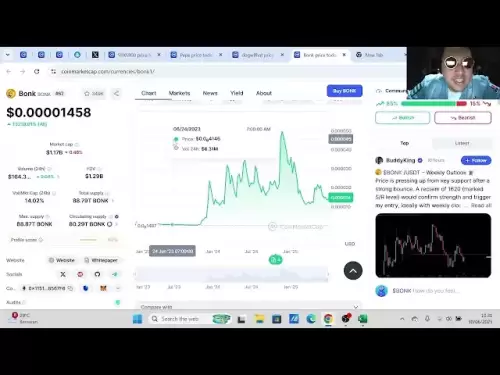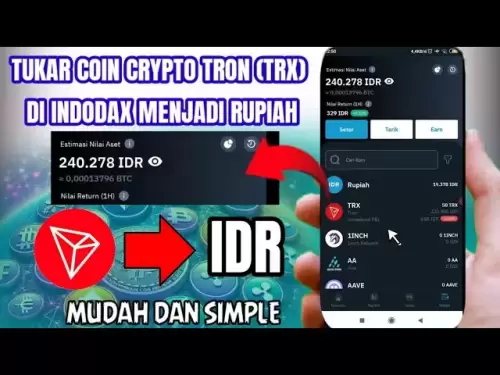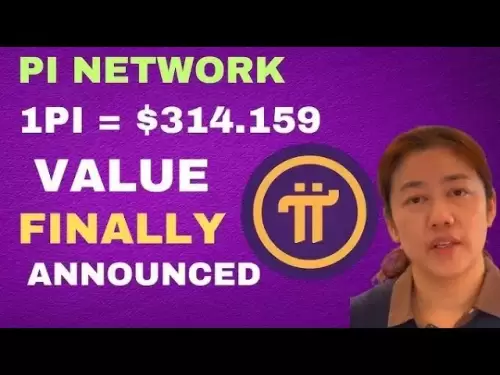-
 Bitcoin
Bitcoin $108,489.6704
1.13% -
 Ethereum
Ethereum $2,502.0528
2.92% -
 Tether USDt
Tether USDt $1.0002
0.00% -
 XRP
XRP $2.1941
0.51% -
 BNB
BNB $655.3375
1.00% -
 Solana
Solana $151.5977
1.27% -
 USDC
USDC $0.9999
0.00% -
 TRON
TRON $0.2768
0.32% -
 Dogecoin
Dogecoin $0.1676
2.86% -
 Cardano
Cardano $0.5675
0.98% -
 Hyperliquid
Hyperliquid $40.6109
7.48% -
 Bitcoin Cash
Bitcoin Cash $500.7746
2.09% -
 Sui
Sui $2.8328
2.03% -
 Chainlink
Chainlink $13.4452
1.26% -
 UNUS SED LEO
UNUS SED LEO $9.1623
0.39% -
 Avalanche
Avalanche $18.2267
2.24% -
 Stellar
Stellar $0.2382
0.00% -
 Toncoin
Toncoin $2.8885
1.68% -
 Shiba Inu
Shiba Inu $0.0...01159
0.91% -
 Litecoin
Litecoin $87.1827
0.88% -
 Hedera
Hedera $0.1511
2.90% -
 Monero
Monero $315.4992
-0.59% -
 Polkadot
Polkadot $3.4663
2.34% -
 Bitget Token
Bitget Token $4.6118
-0.65% -
 Dai
Dai $1.0000
-0.01% -
 Ethena USDe
Ethena USDe $1.0003
0.02% -
 Uniswap
Uniswap $7.2989
4.69% -
 Pepe
Pepe $0.0...01003
5.73% -
 Aave
Aave $275.5616
7.15% -
 Pi
Pi $0.5181
-2.49%
How to share a Bitcoin wallet address with others after it is generated?
Securely share your Bitcoin address—not your private keys—via copy/paste, QR codes, or wallet app features. Always verify the recipient and address to avoid irreversible losses from scams.
Mar 13, 2025 at 11:00 am
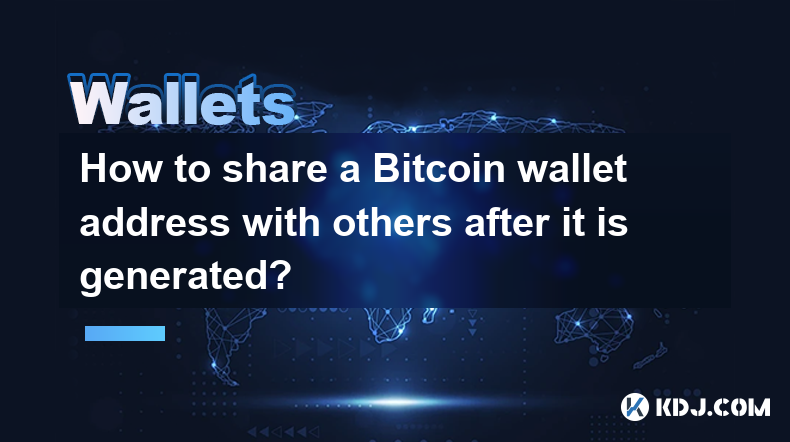
Key Points:
- Sharing a Bitcoin wallet address is straightforward but requires caution. Never share your private keys.
- Multiple methods exist for sharing your address, including QR codes, direct copying, and using wallet apps' built-in sharing features.
- Security is paramount; always verify the recipient's identity and the address before sending funds.
- Be aware of phishing scams that attempt to steal your Bitcoin.
How to Share a Bitcoin Wallet Address with Others After It is Generated?
Generating a Bitcoin wallet address is just the first step. You then need to share it securely with whoever you intend to receive Bitcoin from. This process, while seemingly simple, demands a high level of vigilance to avoid scams and loss of funds. Your Bitcoin wallet address is like your bank account number; sharing it allows others to send you funds. However, unlike a bank account, losing your Bitcoin is irreversible unless you have a backup.
The most common and arguably safest method is to simply copy and paste the address. Your Bitcoin wallet will display your address; select it, copy it, and then paste it into the recipient's communication channel. Ensure the address is copied correctly, as even a single incorrect character will render the transaction invalid. Always double-check the address before sending any Bitcoin.
Another convenient way is to use a QR code. Most Bitcoin wallets offer the option to generate a QR code representation of your address. This can be scanned by the sender using their wallet app, eliminating the risk of manual typing errors. This method is faster and less prone to mistakes. Remember to only generate QR codes from within your trusted wallet app.
Some wallets offer built-in sharing features. These features might allow you to directly share your address through various messaging apps or email. Always ensure you are using the official app and not a malicious imitation. Before using such a feature, read the app's security guidelines.
Regardless of the method you choose, never share your private keys. Your private key is the secret password to your Bitcoin wallet. Anyone with access to your private keys can steal all your Bitcoin. Keep your private keys securely stored offline, preferably in a hardware wallet. Losing your private keys is like losing the key to your bank vault; access to your funds is lost forever.
Remember to always verify the recipient's identity before sharing your Bitcoin wallet address. Be wary of unsolicited requests for Bitcoin, and never send funds to addresses you don't completely trust. Scammers often create fake websites or impersonate legitimate individuals to trick users into sending them Bitcoin.
It's crucial to understand the difference between your Bitcoin address and your private key. Your Bitcoin address is public and can be shared freely, but your private key must remain strictly confidential. The private key is what grants you access to your Bitcoin; never compromise it.
Consider the platform you are using to share your Bitcoin address. Using a secure messaging app with end-to-end encryption will add an extra layer of security to the process. This helps prevent interception of your address by malicious actors.
When sharing your Bitcoin address via email, avoid using plain text. Instead, use a secure method like PGP encryption to protect your address from potential eavesdroppers. This added security measure is vital when dealing with sensitive financial information.
If you're unsure about a request to send Bitcoin, it's always best to err on the side of caution. Do not send any Bitcoin unless you are 100% certain of the recipient's identity and the legitimacy of the request.
Finally, keep your software updated. Regular updates patch security vulnerabilities that hackers could exploit to steal your Bitcoin. Using outdated software increases your risk of falling victim to a scam.
Frequently Asked Questions:
Q: What happens if I share my private key?
A: Sharing your private key gives anyone access to your Bitcoin. They can spend all your funds, and you will have no way to recover them.
Q: Can I change my Bitcoin wallet address?
A: You can't change your existing Bitcoin address, but you can generate a new one within your wallet. Any Bitcoin sent to your old address will still be received.
Q: Is it safe to share my Bitcoin address on social media?
A: It is generally not recommended to share your Bitcoin address on social media platforms. This increases the risk of your address being targeted by scammers or malicious actors.
Q: What should I do if I think my Bitcoin address has been compromised?
A: If you suspect your Bitcoin address has been compromised, immediately secure your private keys and contact your wallet provider for assistance. Consider changing your passwords and reviewing your transactions.
Q: How can I verify a Bitcoin address before sending funds?
A: Carefully compare the address with the one provided by the recipient. Look for any discrepancies in characters. If possible, ask the recipient to confirm the address through a separate secure communication channel.
Q: Are there any fees associated with sharing a Bitcoin address?
A: Sharing your Bitcoin address itself is free. However, there are transaction fees associated with sending and receiving Bitcoin, which are paid by the sender. These fees vary depending on network congestion.
Disclaimer:info@kdj.com
The information provided is not trading advice. kdj.com does not assume any responsibility for any investments made based on the information provided in this article. Cryptocurrencies are highly volatile and it is highly recommended that you invest with caution after thorough research!
If you believe that the content used on this website infringes your copyright, please contact us immediately (info@kdj.com) and we will delete it promptly.
- Ripple, Stablecoin, Adoption: RLUSD Leading the Charge
- 2025-06-30 14:30:12
- Bitcoin ETF, IBIT, and the Bull Flag: Is $144,000 on the Horizon?
- 2025-06-30 14:50:12
- Bitcoin, Passive Income, and a Bull Raise: Riding the Crypto Wave
- 2025-06-30 14:30:12
- Bitcoin, Personal Loans, and Omega 88: A New Era in Lending?
- 2025-06-30 15:09:14
- Saylor's Strategy: How MicroStrategy's Bitcoin Bet is Reshaping Finance
- 2025-06-30 14:52:14
- Metaplanet's Bitcoin Blitz: From Zero to Hero in the Corporate Treasury Race
- 2025-06-30 15:10:54
Related knowledge
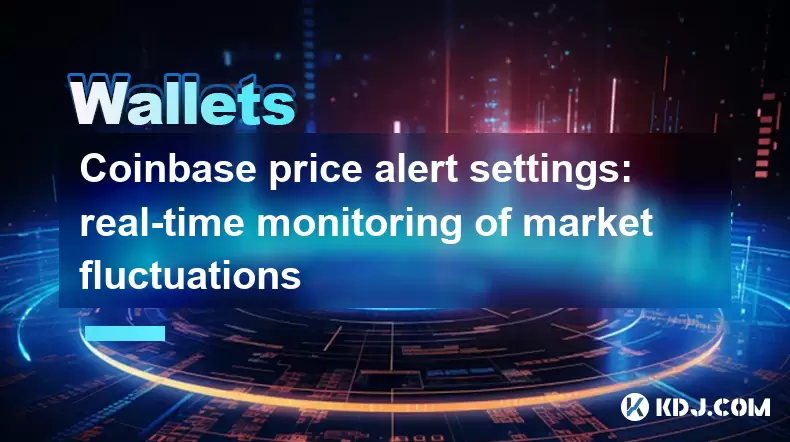
Coinbase price alert settings: real-time monitoring of market fluctuations
Jun 29,2025 at 07:00am
Setting Up Coinbase Price AlertsTo begin real-time monitoring of market fluctuations on Coinbase, users can utilize the built-in price alert feature. This function allows you to receive notifications when a cryptocurrency reaches a specific price point. To access this setting, open the Coinbase app or log in via the web platform. Navigate to the 'Prices...

How to stake cryptocurrencies on Coinbase? Benefits and risks
Jun 27,2025 at 06:36pm
Understanding Cryptocurrency Staking on CoinbaseStaking cryptocurrencies involves locking up digital assets to support the operations of a blockchain network, typically in return for rewards. Coinbase, one of the most popular cryptocurrency exchanges globally, offers staking services for several proof-of-stake (PoS) coins. Users can stake their holdings...
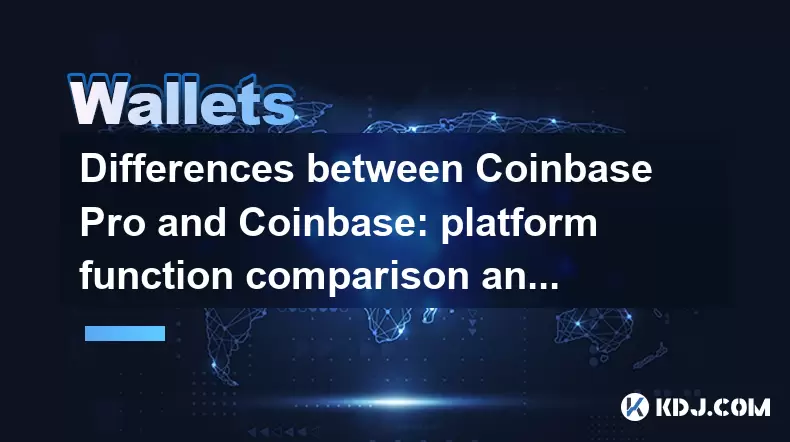
Differences between Coinbase Pro and Coinbase: platform function comparison and analysis
Jun 29,2025 at 08:21am
Overview of Coinbase and Coinbase ProWhen exploring the cryptocurrency trading landscape, users often encounter two platforms under the same parent company: Coinbase and Coinbase Pro. While both are operated by the same organization, they cater to different types of users and offer varying features. Coinbase is primarily designed for beginners and casua...
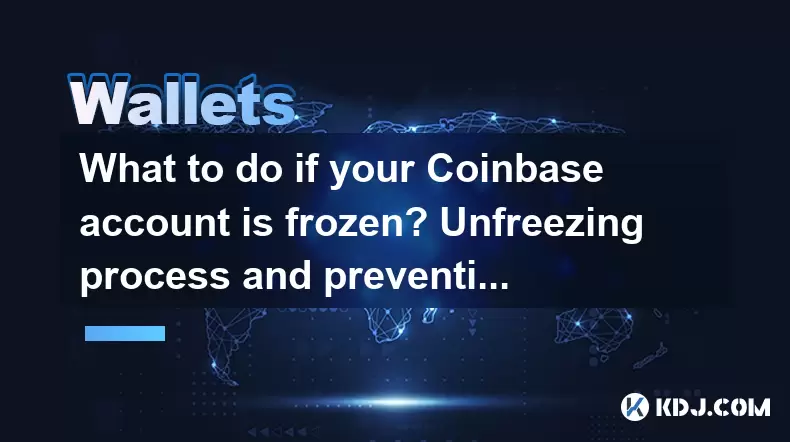
What to do if your Coinbase account is frozen? Unfreezing process and preventive measures
Jun 30,2025 at 03:49am
Understanding Why Your Coinbase Account Might Be FrozenIf your Coinbase account is frozen, it typically indicates that the platform has detected suspicious activity or potential violations of its terms of service. This could be due to a variety of reasons such as unusual login attempts, high-risk transactions, or incomplete verification steps. Coinbase ...

How to contact Coinbase customer service? Support channels and response times
Jun 28,2025 at 01:29pm
Contacting Coinbase Customer Service: Support Channels and Response TimesIf you're a user of Coinbase, reaching their customer service team may become necessary for various reasons, such as account verification issues, transaction disputes, or technical difficulties. Understanding the different support channels available and what to expect in terms of r...

Coinbase advanced trading function usage tutorial: limit orders and market orders
Jun 28,2025 at 09:07pm
Understanding the Difference Between Limit Orders and Market OrdersWhen using Coinbase's advanced trading features, it is crucial to understand the fundamental difference between limit orders and market orders. A market order executes immediately at the best available price on the market. This type of order ensures that your trade goes through quickly, ...

Coinbase price alert settings: real-time monitoring of market fluctuations
Jun 29,2025 at 07:00am
Setting Up Coinbase Price AlertsTo begin real-time monitoring of market fluctuations on Coinbase, users can utilize the built-in price alert feature. This function allows you to receive notifications when a cryptocurrency reaches a specific price point. To access this setting, open the Coinbase app or log in via the web platform. Navigate to the 'Prices...

How to stake cryptocurrencies on Coinbase? Benefits and risks
Jun 27,2025 at 06:36pm
Understanding Cryptocurrency Staking on CoinbaseStaking cryptocurrencies involves locking up digital assets to support the operations of a blockchain network, typically in return for rewards. Coinbase, one of the most popular cryptocurrency exchanges globally, offers staking services for several proof-of-stake (PoS) coins. Users can stake their holdings...

Differences between Coinbase Pro and Coinbase: platform function comparison and analysis
Jun 29,2025 at 08:21am
Overview of Coinbase and Coinbase ProWhen exploring the cryptocurrency trading landscape, users often encounter two platforms under the same parent company: Coinbase and Coinbase Pro. While both are operated by the same organization, they cater to different types of users and offer varying features. Coinbase is primarily designed for beginners and casua...

What to do if your Coinbase account is frozen? Unfreezing process and preventive measures
Jun 30,2025 at 03:49am
Understanding Why Your Coinbase Account Might Be FrozenIf your Coinbase account is frozen, it typically indicates that the platform has detected suspicious activity or potential violations of its terms of service. This could be due to a variety of reasons such as unusual login attempts, high-risk transactions, or incomplete verification steps. Coinbase ...

How to contact Coinbase customer service? Support channels and response times
Jun 28,2025 at 01:29pm
Contacting Coinbase Customer Service: Support Channels and Response TimesIf you're a user of Coinbase, reaching their customer service team may become necessary for various reasons, such as account verification issues, transaction disputes, or technical difficulties. Understanding the different support channels available and what to expect in terms of r...

Coinbase advanced trading function usage tutorial: limit orders and market orders
Jun 28,2025 at 09:07pm
Understanding the Difference Between Limit Orders and Market OrdersWhen using Coinbase's advanced trading features, it is crucial to understand the fundamental difference between limit orders and market orders. A market order executes immediately at the best available price on the market. This type of order ensures that your trade goes through quickly, ...
See all articles























